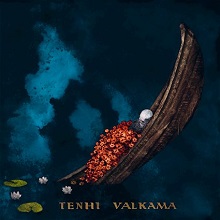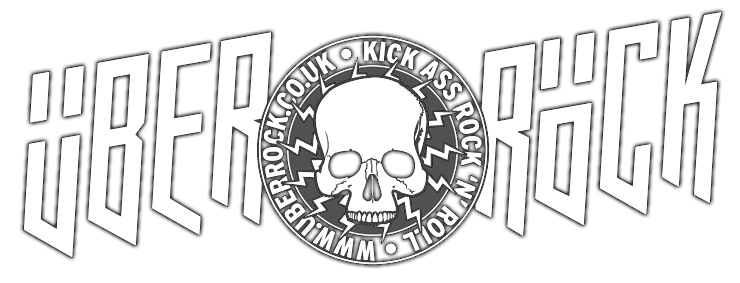By Bona Pjarren
 When night falls onto the sub-arctic landscapes of the Land of the Thousand Lakes, in the twilight of forest and swamps, the veils between our reality and the otherworld grow thin. It is at those times that stories such as ‘the fairy tale that never was’ leak into the lyrics and music of Tenhi.
When night falls onto the sub-arctic landscapes of the Land of the Thousand Lakes, in the twilight of forest and swamps, the veils between our reality and the otherworld grow thin. It is at those times that stories such as ‘the fairy tale that never was’ leak into the lyrics and music of Tenhi.
On their sixth album, ‘Valkama’, which translates as ‘harbour’ or ‘shelter’ among other meanings, the Finns originally began telling of a journey that was meant as a fairy tale in a burning, war-torn village and the crossing over dark waters to an island of the dead. The island is called Verisurma (“the place for those who have suffered blood-death”) in Finnish folklore, where those dwell that died in war or were killed with a blade, and who shed blood on its shore forever. Yet, during the ten years that Tenhi were working on the album, our reality started to bleed into the otherworld with its own terrors and wars. Year after year, the musicians felt their story becoming more and more real until the point was reached that the band decided to change course.
This meant that their journey from this world to the other is more abstract and peaceful while still crossing dark waters, but after a decade Tenhi have found the harbour called ‘Valkama’. This transition of the story but also the long journey that the band undertook to reach their sheltering harbour are both reflected in the artwork of ‘Valkama’: an old wooden boat serves as a metaphor for various meanings such as a vessel, a coffin, a womb, a shelter, change, and the journey itself.
Tenhi could hardly have picked a more suitable band-name. This old Finnish word means a person that is an ‘elder’ or ‘shaman’. And while the shamans of the ancient nomadic Finns are the guardians against but also the mediators between their communities and the spirit world, Tenhi are their musical equivalent as a liminal force between dark folk, folk rock, and even reaching out into the normally electrified world of metal. The latter invites comparison with Wardruna and Heilung, although in a spiritual meaning and certainly not by way of a stylistic comparison.
In relation to the music itself, ‘Saattue’ is subtle and gentle in its introduction. Building slowly with a film score quality to it. It is hauntingly beautiful. There is a skilful mix of acoustic instruments with key washes. ‘Saattue’ means convoy and it certainly transports us into the journey that is to come.
‘Kesävihanta’ means “summer vegetable” and is a beautifully delicate track. Some of the guitar work reminded me of Clannad. The choir really does mix well with the guitar work in this stripped back song. ‘Valkama’ itself is a fuller sounding track in comparison. Again predominantly an acoustic track, the film score feel is in evidence once more in parts of this composition. ‘Rintamaan’ or “to the front” is an up tempo millitaristic piece. It is rousing in its subtlety and the flute really adds to its appeal.
‘Rannankukka’ means “beach flower” and is another up tempo track, this time utilizing frame drums alongside the drum kit. It is a roving acoustic guitar driven piece. ‘Laineinen’ means “wavy”. And it is, as its beautiful guitar riffs float along in this dreamy song. Strings give it a darker undercurrent.
‘Hele’ means “all”. We’re back to more epic sounds and a classical approach to writing in that it is full off light and shade. It is wonderfully paced and unhurried in the way it reveals new ideas and builds on what has gone before. ‘Ulapoi’ means “forget it”. It is a robust fairytale type track with a strong beat from the frame drum and vocals hung hauntingly over the top of it. Strings augment the vocals to give depth. There is also some interesting keyboard work on display.
‘Elokuun linnut’ means “birds of August”. It is another roving piece of music with some unusual time signatures and feels quite progressive rock in its approach. Soaring melodies make for quite an impact. The piano in particular gives it a more contemporary nuance. ‘Sydämes On Tiel’ means “the heart is the way”. It is unashamedly folk rock in its rendering, skilfully melding flute with strummed acoustic guitar, and augmented with pleasant string washes.
Onto the penultimate track, and ‘Veden Elein’ means “water gestures”. Again the weird time signatures are to the fore and haunting melodies are brought into play. There is some interesting picked guitar work on the verse. ‘Aina Sininen Aina’ means “always blue always”. After some quiet ambience, kicks in with blocks of piano chords and vocals resolving into a more flowing form. It is sparse in style but very listenable. It gradually builds in intensity, bringing the album to a climactic conclusion.
All in all, ‘Valkama’ is a decent album, very melodic if understated. It is very much an album to kick back and relax to. I perhaps could have done with a bit more drama in the composition and would have liked to know a bit more of the story behind the album, as Finnish is not a language that I understand. It is , nonetheless, an album well worth giving a listen to.
- ‘Valkama‘ is out now.
- All content © Über Rock. Not to be reproduced in part or in whole without the express written permission of Über Rock.
